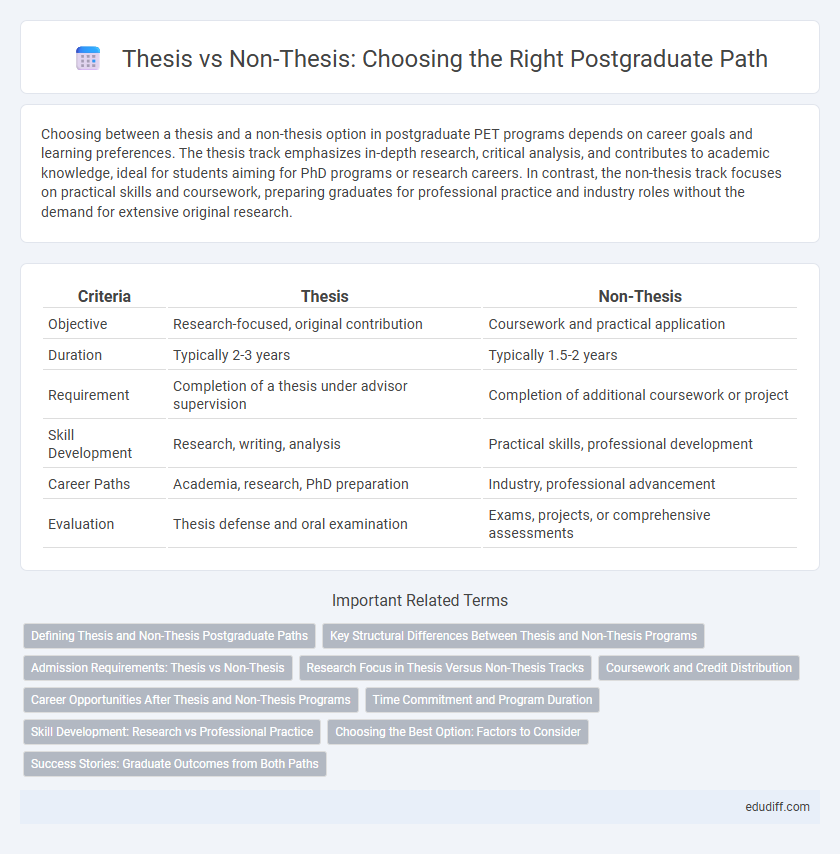Choosing between a thesis and a non-thesis option in postgraduate PET programs depends on career goals and learning preferences. The thesis track emphasizes in-depth research, critical analysis, and contributes to academic knowledge, ideal for students aiming for PhD programs or research careers. In contrast, the non-thesis track focuses on practical skills and coursework, preparing graduates for professional practice and industry roles without the demand for extensive original research.
Table of Comparison
| Criteria | Thesis | Non-Thesis |
|---|---|---|
| Objective | Research-focused, original contribution | Coursework and practical application |
| Duration | Typically 2-3 years | Typically 1.5-2 years |
| Requirement | Completion of a thesis under advisor supervision | Completion of additional coursework or project |
| Skill Development | Research, writing, analysis | Practical skills, professional development |
| Career Paths | Academia, research, PhD preparation | Industry, professional advancement |
| Evaluation | Thesis defense and oral examination | Exams, projects, or comprehensive assessments |
Defining Thesis and Non-Thesis Postgraduate Paths
Thesis postgraduate paths demand original research and a comprehensive written document that contributes new knowledge to the field, requiring extensive data collection and analysis. Non-thesis postgraduate paths emphasize coursework, practical skills, and projects, often including comprehensive exams or internships instead of a formal thesis. Choosing between thesis and non-thesis options depends on career goals, with thesis paths suited for research or academic careers and non-thesis paths tailored for professional practice and applied expertise.
Key Structural Differences Between Thesis and Non-Thesis Programs
Thesis programs require original research culminating in a formal written document, emphasizing research methodology, data analysis, and critical thinking skills. Non-thesis programs prioritize coursework, practical application, and comprehensive exams, focusing on professional skills and knowledge acquisition. Key structural differences include the presence of a supervisor-guided research project in thesis tracks versus additional coursework or internships in non-thesis tracks.
Admission Requirements: Thesis vs Non-Thesis
Admission requirements for thesis-based postgraduate programs typically include a strong academic record, letters of recommendation, a research proposal, and sometimes a relevant background in research methods. Non-thesis programs often prioritize a good academic standing and professional experience, with less emphasis on research skills or proposals. Both pathways require meeting the minimum GPA and standardized test scores, but thesis tracks demand demonstrated research aptitude for eligibility.
Research Focus in Thesis Versus Non-Thesis Tracks
Thesis tracks in postgraduate programs emphasize deep research engagement, requiring students to conduct original studies, analyze data, and contribute new knowledge to their field. Non-thesis tracks prioritize coursework and applied learning, focusing on practical skills and professional development rather than extensive research. The research focus in thesis tracks benefits students aiming for academic or research-oriented careers, while non-thesis tracks suit those pursuing industry roles or advanced expertise without the research component.
Coursework and Credit Distribution
In postgraduate programs, thesis options typically require extensive research credits, allocating around 6 to 12 credit hours for thesis work, while non-thesis tracks emphasize coursework with 30 to 36 credit hours distributed across core and elective subjects. Thesis pathways focus on a balance of specialized research and foundational courses, often involving 18 to 24 credit hours in coursework, whereas non-thesis options allocate nearly all credits to structured classes. Credit distribution directly influences program duration and skill development, with thesis options fostering in-depth research expertise and non-thesis tracks prioritizing comprehensive subject mastery through diverse coursework.
Career Opportunities After Thesis and Non-Thesis Programs
Choosing a thesis-based postgraduate program often opens doors to research-focused careers and doctoral studies, emphasizing analytical skills and subject matter expertise. Non-thesis programs cater to professionals seeking practical knowledge and direct industry application, enhancing job readiness in sectors like business, healthcare, or technology. Career opportunities after thesis programs typically include academic, research, and specialized roles, whereas non-thesis graduates may find diverse positions in management, administration, and applied fields.
Time Commitment and Program Duration
Thesis-based postgraduate programs typically demand a longer time commitment, often extending the program duration by several months due to research, data collection, and writing requirements. Non-thesis programs usually allow students to complete their studies faster, focusing on coursework and practical applications rather than original research. The decision between thesis and non-thesis tracks significantly affects the total time investment and the intensity of academic workload during postgraduate study.
Skill Development: Research vs Professional Practice
Thesis-based postgraduate programs emphasize advanced research skills, critical analysis, and academic writing, preparing students for careers in academia or research-intensive roles. Non-thesis programs prioritize professional practice, focusing on applied skills and practical knowledge relevant to industry settings and immediate workforce integration. Choosing between the two depends on whether the student aims to develop expertise in systematic investigation or enhance hands-on competencies for professional environments.
Choosing the Best Option: Factors to Consider
Selecting the best postgraduate option between thesis and non-thesis pathways depends on career goals, research interests, and time availability. Thesis tracks emphasize original research and critical analysis, ideal for students pursuing doctoral studies or research careers. Non-thesis programs focus on coursework and practical skills, suitable for professionals aiming for industry roles or accelerated graduation.
Success Stories: Graduate Outcomes from Both Paths
Graduate outcomes from thesis and non-thesis postgraduate paths demonstrate strong career advancements and diverse opportunities. Thesis students often excel in research-intensive roles and academic positions, contributing to published work and specialized expertise. Non-thesis graduates frequently achieve success in industry, leadership, and professional fields, leveraging practical skills and applied knowledge for immediate workforce impact.
Thesis vs Non-thesis Infographic

 edudiff.com
edudiff.com